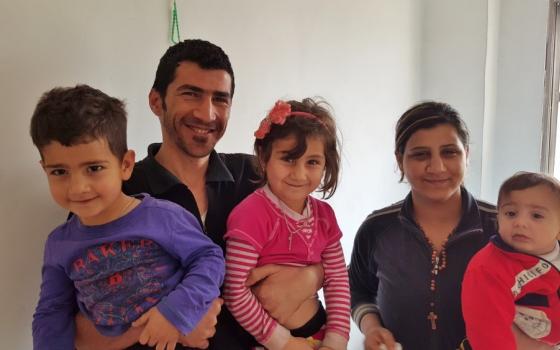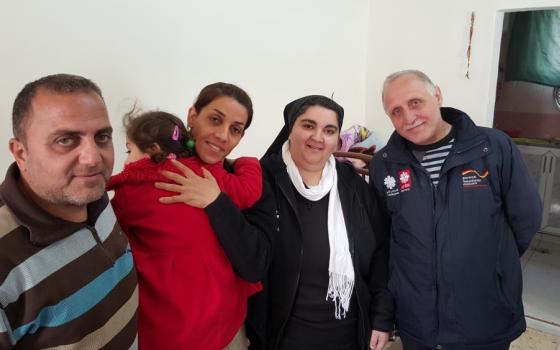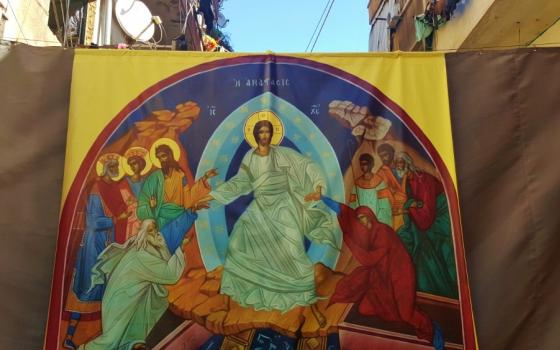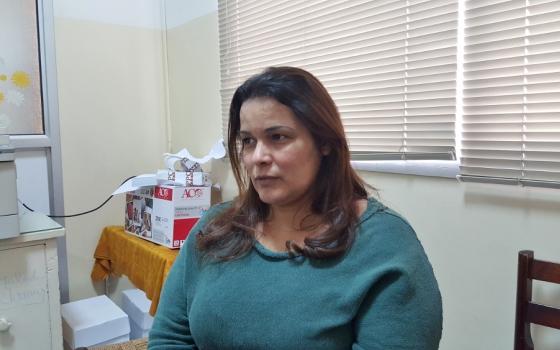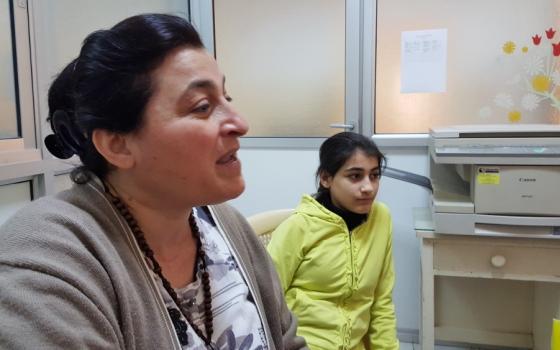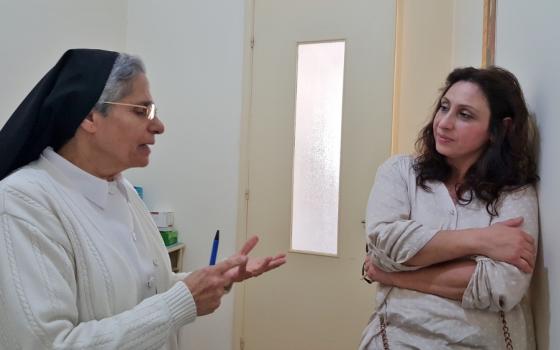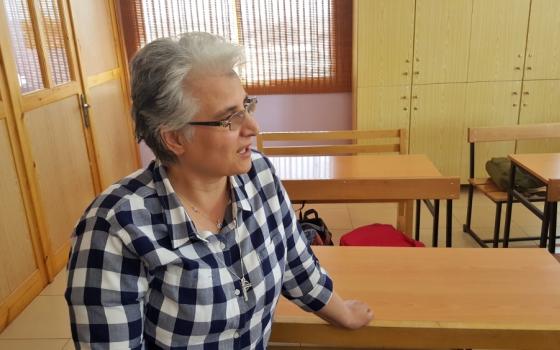Editor's note: GSR correspondent Chris Herlinger spent three weeks reporting in Lebanon and Jordan on the refugee crisis. While there, he also spoke with some refugees about the significance of the Lenten and Easter season. In this region, Eastern Catholics, some of whom, like Orthodox Christians, celebrate Easter on May 1 this year.
______
For many Christian refugees from Iraq and Syria now living in Jordan and Lebanon, this year's Easter will be celebrated in the heart — but not necessarily on the table.
On a warm spring day in their bare apartment in the Al-Hashni neighborhood of Amman, Jordan, Sabhan Jinan Maqadas Hasso and Lina Safaa Najeeb Alkes Asahq smiled as they recalled past Easter feasts in their hometown of Mosul, Iraq, when the centerpiece of the meal was a lamb stuffed with meat and rice.
Best not to dwell on the past, said Hasso and Asahq. The family fled war-torn Mosul in early 2015 for Amman. As the young couple and their three young children await word of their official application for asylum and the possibility of new life in Europe or elsewhere, Easter will be a simple affair. Their celebration will be focused on religious observances at a nearby Syrian Catholic Church.
"The most important thing is to celebrate the Mass," Asahq said. An Easter meal can await another year.
The immediate family is together — reason enough to give thanks. But any sense of stability in life is gone in the waiting and anxiety about their immigration status. "Inside there is no peace," Hasso said. "It brings us sadness."
Maybe that is why the Lenten and Easter season — normally a time of reflection, repentance and, ultimately, rejoicing — is this year perhaps more about recovery from the trauma of war, fear and flight. So much overshadows the Middle East right now as Christians mark Easter, which for many Christians in Jordan is celebrated in accordance with the Orthodox calendar, on May 1 this year. In Lebanon, the Orthodox churches mark Easter that day, as well. But the so-called "Occidental" churches will celebrate Easter, as many in the United States and other countries do, this coming Sunday, March 27.
A five-minute drive from Hasso and Asahq's small walkup apartment is the home of Wilsin Salim Dawood Agla and Lina Behnam Majeed Hanusi and their young daughter. Like the other couple, they are Christians from Mosul, Iraq. Though new to Amman, they, like Asahq and Hasso, left Iraq because of threats from the so-called Islamic State group (ISIS), aerial bombardments and other acts of violence that made living an unwelcome test and endurance.
Life in their first-floor apartment — a plain, unadorned living area, bathroom and small kitchen — now centers on waiting to hear of their refugee status. (If they are granted official refugee status, the family can go to another country. They would like to go to Australia, where they hear refugees can get started more easily in a new life). For now, the family is dependent on food packages and other humanitarian assistance provided by Caritas and other church groups.
The mood is uncertain. Yet Hanusi in particular takes comfort from attending Mass daily and in the assurance, she said confidently, that God has not forgotten her family — and never will. "God will not abandon us," Hanusi said. "God will not leave us. We are sure he will help us get out of this situation."
The memories of the last months — of leaving under threat, the uncertainty about their home, friends and family are still fresh. The family, including a 3-year-old daughter, has only been in Amman two months.
"We feel sadness, we can't describe how hard it was, the days we spent," Hanusi said. "But we still have faith in God."
Sitting next to the mattress on the floor that serves as both bed and sofa in the small living area, Agla says quietly, "We can be angry at the social situation in Iraq but not at God. Angry thinking about family needs? Yes. But anger at God? No."
They have put aside thoughts of any fine Easter meal — Mass will be the centerpiece of their Easter together, and that is enough, Hanusi said. "We can live Easter in our hearts. There are no limits in our hearts. Attending Easter Mass, that will be Easter. We will thank God for everything this Easter."
Sr. Nesreen Dababneh, a Jordanian nun who works at a Caritas clinic for refugees in the neighborhood, calls this kind of faith "touchable" because it is deeply felt, an example of incarnation.
"Easter is the most appropriate feast for this time of year," she said, because it is Easter, not Christmas, that tries to make sense of the mystery of how to live amid pain. "It's not a philosophy, it's a reality," said Dababneh, a psychologist by training who oversees a program to help refugees with trauma and other effects of war, flight and displacement.
"When life doesn't give you the answer of hope, you can find the answer in your faith, in Jesus Christ's resurrection," she said. If you look at the plight of refugees strictly from politics, there is little hope, she said, comparing it to the sepulcher or Jesus's empty tomb. "There is no hope, it is dark, there is no life," she said, noting that many refugees have no hope returning to their home countries. "All signs point to the end. But God made a miracle" — a miracle Christians celebrate at Easter.
Celebration of Easter is in order but with some sober reflection needed, said Wafa Goussous, an executive with the Middle East Council of Churches, a regional ecumenical body. "I think churches in the West must sacrifice. Easter is about the sacrifice and the resurrection, this is what the Father offered his children," she said. In practical terms, that means that Christians, wherever they are, must be willing "to step out of our comfort zones" and respond more rigorously to such dire humanitarian crises as the Syrian and Iraqi refugee crisis.
"The Christians in the world must ask, 'How are we celebrating Easter?'" she said. In the case of the refugee crises, "to witness a disaster like this, with children being thrown into the sea, and then [for Christians in other countries] kneeling down and praying to the Lord to help them — no, it's not enough anymore. Christians must raise our voices by putting pressure on the politicians to seek peaceful solutions and stop this humanitarian crisis. Christians and non-Christians in Syria are facing life threats every minute. Sadly, it is becoming only news to be watched on television."
Also reality for Goussous and many others is the flight of Christians from the Middle East. Some are trying to escape wars and conflict; others are simply worn out from an atmosphere that makes Christians unwelcome in the region from which Jesus and his movement originated — and on which Christian holy places and sites still stand. "This is our home," Goussous said of the need of protecting Christian traditions and holy places. "Where else can we go?"
In nearby Lebanon, similar worries bedevil this Easter season.
The family of Syrian refugee Mervat Dib, the mother of four children, fled Syria because of threats posed by ISIS. The fear of rape was a particular worry, she said. "We don't talk of those things," she said recently at a Beirut health clinic run by the Assembly of Female Religious Congregations, a consortium of sisters from different congregations.
Dib believes there is no future in Syria for Christians and wonders what kind of future there may be in the Middle East as a whole. "Christians are being persecuted in Syria and other countries in our region. We need to take care of the Christians now."
Iraqi refugee Sanaa Abdallah Yaacoub, 42, agrees. As Easter is celebrated in the region, attention must be paid to concrete solutions to help achieve peace and secure safety for those, like her and her family, who have fled unsafe places. "I ask for peace at this time of year. We have no aim, we're lost," said the mother of five children, ages 12 to 21 and a widow — her husband died in 2011 from a car bomb explosion. "That is why we are searching for a place in peace."
The search for security and the remembrance of the Easter narrative that originated in the Middle East have particular poignancies right now.
"This is his [Jesus'] land, and we are his people," said Marlene Constantin, a project manager at the Catholic Near East Welfare Association / Pontifical Mission. As she reflects on this year's Easter, she thinks it is essential for all Christians to embrace the essential teachings of Jesus. "These problems we face in the region are far from his experience and teaching," Constantin said. "I think everything starts from that point."
She worries about the "power of evil" and the "evil stance" she sees in the region now. The Christian community often feels under threat. And yet, she believes Easter's quintessential message is that "even with these problems, Jesus will not abandon us." So she continues to affirm her faith.
So does Salvatorian Sr. Susanne Rahhale, who works at the sisters' clinic, located in the Nabaa-Bourj Hammoud neighborhood. Rahhale embraces the message of Pope Francis in stressing "divine mercy," the need to reveal the holy in everyday life. "Helping others is one way to convey this message," she said.
It is telling that Rahhale mentioned Pope Francis. The pontiff, in opening Holy Week celebrations, compared the fate of refugees in the world today to the indifference experienced by Jesus, saying, "many do not want to take responsibility for the fate of the many emarginated people, the many migrants, the many refugees."
Two members of the Antonine Sisters, a Lebanese Maronite Catholic congregation, were equally adamant on the theme of remembering refugees and the need to end the wars that have caused so many to flee their homes.
"Peace, peace, peace," Sr. Judith Haroun, the congregation's general superior, said emphatically in a recent interview at the congregation's mother house outside of Beirut.
Antonine Sr. Isabelle Nassif, local superior of Our Lady of Grace Convent, agreed, and has particular hopes for her country. "We are just praying for peace. Peace and justice." She paused. "We hope that our Lebanon will flourish again, like the cedar of Lebanon" — a reference to Lebanon's continued challenges in recovering from past conflicts as wars in neighboring countries still rage, and the crush of refugees continues.
It is not always easy, she added, to affirm the "yes" of the Christian message, particularly in challenging times. "It can be difficult; it's not always sweet. But it keeps going and going and going, and it gets stronger. We do it for him [Jesus]. We have to show his face to the world."
In Lebanon's Beqaa Valley, Good Shepherd Sr. Amira Tabet coordinates a social service center that provides education and other needs for a predominately Muslim population. To Tabet, Easter reaffirms the Holy See's affirmation of divine mercy, as well as the sacramental life of service and charity to others. "It is unlimited love," she said of Christ's life and example.
"The love of Christ resurrected is stronger than anything in the world."
[Chris Herlinger is GSR's international correspondent. His email address is [email protected].]
Related coverage:
Syrian and Iraqi refugees wait in Lebanon for safety, new life
For Syrian refugees, prayer campaign keeps them from being forgotten amid news of Russia's pullout
